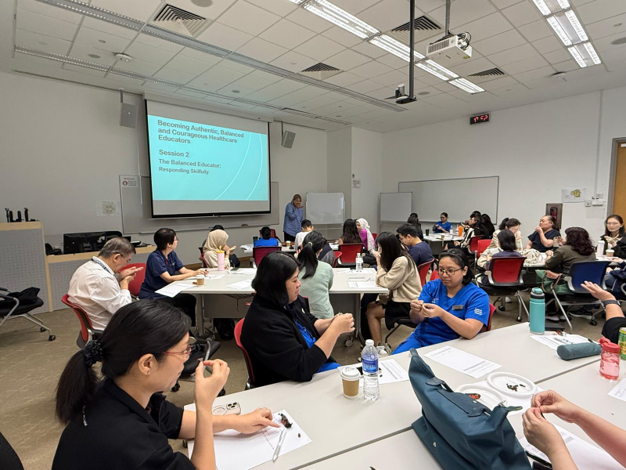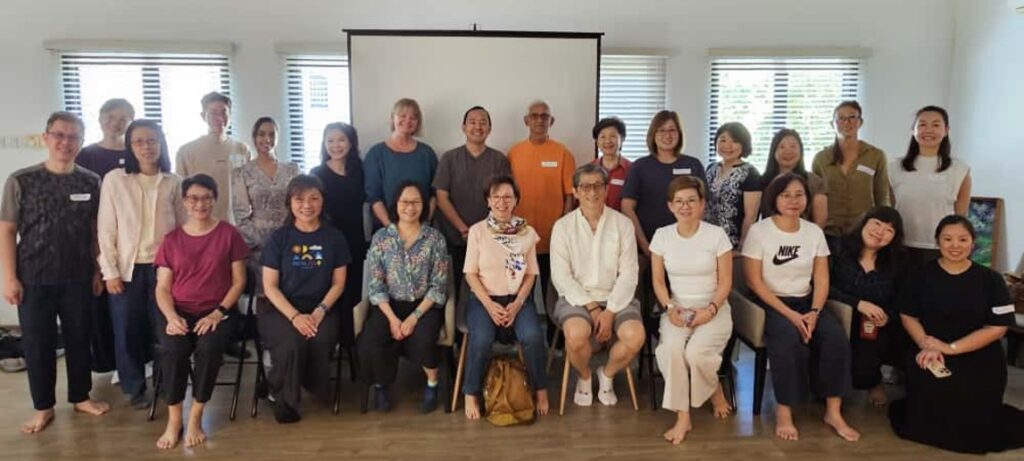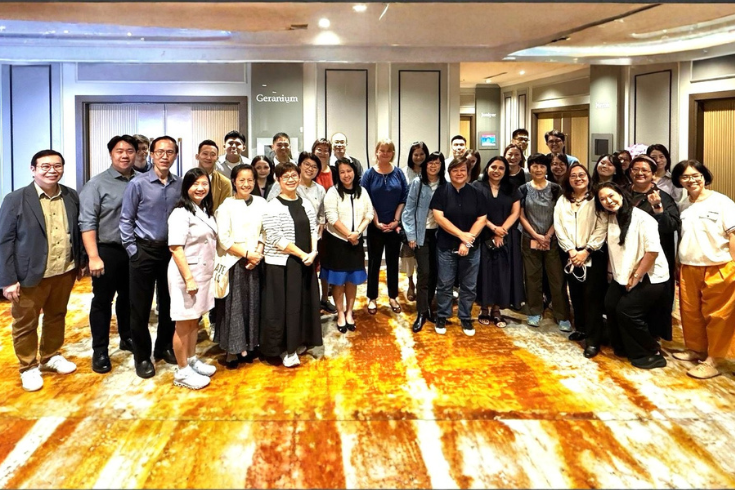When we talk about leadership, we often think about strategy, decision-making, and outcomes. But what about presence? What happens when a leader’s way of being – their ability to listen deeply, stay grounded, and respond with clarity – becomes their most powerful tool?
Listen to the audio version of the blog ⬇️
During my recent time in Singapore, I had the privilege of working with a group of educational leaders through the Academy of Principals (API). Together, we explored how mindfulness can shape leadership that is not only effective but deeply human.
Across schools and systems, the challenges facing leaders today are immense – from supporting staff well-being to navigating constant change. Yet, in the midst of it all, I witnessed how leading with presence can help leaders embody authenticity, balance, and courage.
At Oxford Mindfulness, our mission is to make mindfulness accessible across sectors and cultures – helping individuals and leaders bring awareness and compassion into their everyday work. What I experienced in Singapore reaffirmed that mindfulness is not just a personal practice; it’s a powerful catalyst for cultural change in education.
Why Mindful Leadership Matters
To “lead with presence” means to bring our full attention – mind, body, and heart – to the moment we’re in. It’s about cultivating awareness and steadiness, even when the path ahead feels uncertain.
In practice, this means noticing our reactions, listening more than we speak, and choosing responses that align with our values rather than our impulses. Presence allows leaders to connect authentically, make wiser decisions, and foster environments where others feel seen and supported.
At Oxford Mindfulness, we define mindfulness as “awareness that arises from paying attention, on purpose, in the present moment, and non-judgementally.” When applied to leadership, this awareness strengthens our capacity for authenticity (showing up as we truly are), balance (navigating complexity with perspective), and courage (acting with integrity even when it’s difficult).
Research and lived experience both point to the same truth: when leaders embody presence, they help create cultures of trust and resilience. This kind of leadership doesn’t just improve performance, it transforms relationships and nurtures well-being at every level of a school community.
“What seems like a small act can have profound ripple effects, allowing conversations to unfold with greater clarity and care.“
Inside the Principals Academy Workshop
The one-day Leading with Presence programme in Singapore brought together school principals and senior educational leaders from across the region. These were individuals navigating complex systems and demanding roles. Yet, what struck me most was their openness to self-reflection and curiosity about the inner dimensions of leadership.
Throughout the day, we explored three key themes: authenticity, balance, and courage. Participants reflected on how these qualities show up in their day-to-day decisions – from handling conflict to supporting teacher well-being.
One practical exercise invited leaders to recognise reactivity to a situation, pause before reactivity took over, and then choosing what happened next. What seems like a small act can have profound ripple effects, allowing conversations to unfold with greater clarity and care.
Another exercise focused on mindful listening — tuning in to others without the constant urge to plan or fix. One participant shared afterward, “When I truly listened without needing to solve, I realised how much lighter the conversation became for both of us.”
By the end of the day, the group reflected on how presence could serve as an anchor for leadership: a steady, compassionate awareness that supports wiser action in the face of challenge.
Broader Impact: Healthcare and Community Connections

Beyond the Principals Academy, my time in Singapore included sessions with the National University Health System (NUHS), where teams who train healthcare professionals explored how mindfulness can support compassionate teaching and leadership in clinical settings.
I also had the joy of co-leading a morning of mindfulness and compassion practice with the Mindful Circle community, a gathering that reminded me how collective practice deepens individual learning.
These experiences highlighted a common thread – that presence and compassion are not confined to one sector. Whether in education, healthcare, or community life, the principles of mindful awareness and connection remain universally transformative.

Global Perspective and Invitation
As mindfulness continues to grow globally, we at Oxford Mindfulness are committed to supporting leaders who wish to bring presence into their professional and organisational cultures. The experience in Singapore demonstrated how global collaboration can ignite new ways of leading, grounded not in control or urgency, but in awareness, courage, and care.
Because when we lead with presence, we don’t just shape better schools, we nurture the conditions for human flourishing.
If you’re interested in exploring this further, we invite you to join our upcoming programme: Leading with Presence for Education Leaders: Enabling Cultural Change
Leading with Presence for Education Leaders: Enabling Cultural Change
Starts Wednesday 14 January 2025 | Online
This course offers practical frameworks and guided mindfulness practices designed to help educational leaders cultivate authenticity, balance, and courage in their daily work.
Resources
Leadership and Mindfulness: Current Directions in Theory and Research




